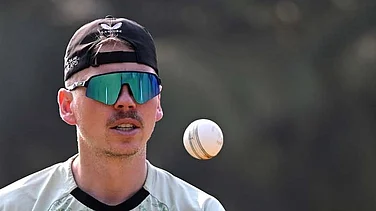Nothing official about it: if it suffers no further hiccups, the Wills World Cup willsee big betting. Bucks, big and small, will change hands as punters—part-time andwhole—hedgetheir money on who will hold aloft the coveted cup on March 17.
So, what’s new? A lot. More competitors, hotter competition, closer margins,better strategies and, above all, better television coverage will make cricket’squadrennial showpiece, the second in the subcontinent, a punter’s delight—to thepuritan’s disgust.
"Only a fool would try to prophesy which way a one-day match, much less atournament, will go," says cricket historian Vasant Raiji. But there are‘fools’ who do. Some plumped for India in the 1983 Cup—and got Rs 10,000for every Rs 100 they placed.
Cricket’s very nature lends itself to wild guessing. Player form, captaincy, pitchcondition, wind direction, heat, moisture, umpires, crowds—anything can swing thefortune of a fixture. Why risk all that? "Because everything in life is agamble," says Sandeep Khosla, a Bombay punter. "Betting gets your adrenalingoing. It gives you a high. It gets you more involved in the game. And probably some moneyat the end of it all."
And what better place to try a hand than at the World Cup? With the stockmarkets downand the best Derbys having been run, incorrigible speculators like Khosla, who bet Rs 20lakh on the 1992 World Cup, are looking forward to the googlies Googly will throw up.Starting from the toss, particularly in matches India and Pakistan play, every ball, everyfall of wicket, four, six, win and loss will mean just one thing: profit or loss.
For the record, cricket betting is illegal in India and doesn’t take place. Thefact is kids bet on Cadburys. Their parents on more. Hundreds of crores are placed on theSharjah tournaments and one-dayers, and all of it over the telephone. With mobile phonesin, bookies say the volumes for the 1996 Cup will only be larger.
And it’s a business run on trust. Big-time bookies do not accept bets below Rs1,000, and that only if the punter has a reference. The largest bet is over the outcome ofthe tournament, and the rest in descending order over a wicket falling, a six being hitand a four being scored. Once the bookie is familiar with the punter’s voice, whenthe match is on, all he does is pick up the phone, bark the odds and note down the bet.The accounts are cleared on Monday, usually a non-racing day. Payments are madeimmedi-ately, unless the punter has an account with the bookie.
"Why isn’t cricket betting legalised in India?" asks Arun Jacob, anexpat Indian who unfailingly plumps for his home country with Ladbrokes in England wherebetting is legal. "This would be a very rich country if it was. The Government islosing crores." Maybe. But it’s an equilibrium few punters—and fewerbookies—want to disturb. Although horse-race betting is legal, it invites a steep 21per cent gambling tax (against 10 per cent in the UK). Punters can gamble only up to Rs5,000. To bet in excess, they have to provide their names and, sometimes, addresses.
Result: heavy punters use codes. A top architect, for instance, uses hisfingers. Five up means Rs 50,000 or Rs 5,00,000 depending on the race and the horse. He istaxed 21 per cent only for Rs 5,000. The spoils from the rest of the bet are sharedbetween punter and bookie at a mutually agreed cut, often 8.5 per cent. It’s a systemthat has bred mafia-style corruption, and cricket bookies, wiser from the racingexperience, want to avoid such a situation. "What’s so illegal about cricketbetting to legalise it?" asks R.N. Sharma, a bookie. "There’s nomanipulation here. And because the Government is not in the picture, even a common man cangamble to his pocket’s content. Forget the Supreme Court verdict; hasn’t legalgambling killed hundreds of families?"
Independent bookies say there is nothing unhealthy in betting on cricket, althoughbetting syndicates in Bombay and Dubai have been blamed for the Salim Malik controversylast year. The Pakistani skipper allegedly offered massive sums to Australian players tothrow away a match. Malik has since been cleared, but asks a punter: "Where did Malikget the money from?"
Aficionados too aver that placing money on cricket is safer than placing it on theturf. "Cricket is a two-horse race, a straightforward win-lose situation. If you havethe knowledge about the sport, some basic intelligence and a little luck, you stand a fairchance," says one punter. "Quite unlike horse-racing where the horse’sweight, handicap, breeding, rider, jockey, trainer and a whole lot of other factors can(and do) queer the pitch."
In spite of the massive sums involved, the reputation of cricket betting hasstill not been sullied, unlike horse-racing. "Races are fixed all over theworld," says a top bookie. "Cricket, more so the World Cup, is different.It’s a market scenario. Nobody can make it happen; it comes about on its own. A lotmore than financial stake is involved—pride, prestige and patriotism."
(Some names have been changed to protect identities.)






















